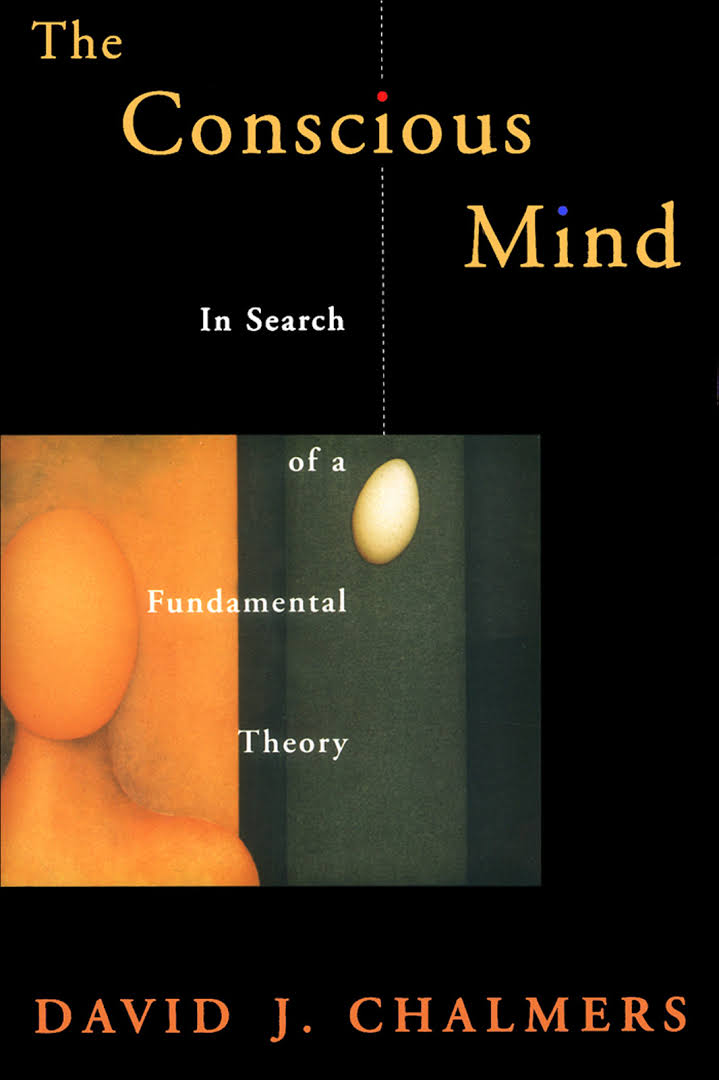the conscious mind: in search of a fundamental theory

This book was published with Oxford University Press in April 1996. It started life as my Ph. D. dissertation at Indiana University (1993), and was revised into a book by adding some new chapters, tightening up the arguments, and making it more accessible. The book is an extended study of the problem of consciousness. After setting up the problem, I argue that reductive explanation of consciousness is impossible and that if one takes consciousness seriously, one has to go beyond a strict materialist framework. In the second half of the book, I move toward a positive theory of consciousness with fundamental laws linking the physical and the experiential in a systematic way. Finally, I use the ideas and arguments developed earlier to defend a form of strong artificial intelligence and to analyze some problems in the foundations of quantum mechanics.
- Full table of contents
- Introduction
- Jacket copy
- Some reviews of the book (43 or so)
- Response to reviews: Mulhauser, Papineau, Searle and Searle follow-up.
Translated into Chinese, French, Italian, Japanese, Korean, Macedonian, Polish, Russian, and Spanish (more in progress).
Cover blurbs (paperback)
“A startling first book.”
–The Economist
“The Conscious Mind is exceptionally ambitious and exceptionally successful – the best book in philosophy of mind for many years. It flies in the faces of fashion, making a formidable case against materialist orthodoxy. Legions of materialists are no doubt busy writing their rejoinders; but there will be few points left for them to make that Chalmers hasn’t made already. We of the materialist opposition cannot go on about how he has overlooked this and misunderstood that – because he hasn’t. All we can do is to disagree about which way the balance of considerations tilts.
–David Lewis, Princeton University
“Eloquent, fiendishly clever….One of the best science books of the year.”
–The Sunday Times (London)
“The Conscious Mind is an outstanding contribution to our understanding of consciousness. Chalmers pursues an idea that most other writers on consciousness have ignored, either because they haven’t thought clearly enough to notice it or because they were terrified of acknowledging it. Writing The Conscious Mind was an act of courage, and Chalmers was no doubt emboldened by a well-founded confidence that he could state his argument with impeccable clarity and rigor.”
–Steven Pinker, author of The Language Instinct
“One of the best discussions of consciousness in existence, both as an advanced text and as an introduction to the issues. One feels that Chalmers has done about as good a job as could be done on this most intractable of problems.”
–Colin McGinn, Times Higher Education Supplement
“Chalmers has written an exciting and fascinating book. I hope that because of it, consciousness in all its paradoxical glory will once more hold center stage in a robust philosophy of mind. ”
–Eric Dietrich, Minds and Machines
Cover blurbs (hardback)
“Consciousness is the challenge to the physicalist orthodoxy in current cognitive science and philosophy of mind. This book is a brilliant presentation of that challenge. In addition, it is a major essay in the philosophy of mind that has much to teach us whatever our allegiances.”
–Frank Jackson, Australian National University
“In my view, The Conscious Mind will likely be considered the best of the many books that have appeared on the topic of consciousness in the past several years. Unlike many recent writers, Chalmers does not evade the problem of consciousness by redefining the problem away; he faces the problem squarely and is prepared to take the consequences. The book is written with admirable and refreshing clarity, and brims with enthusiasm and a sense of excitement. ”
–Jaegwon Kim, Brown University
“In theorizing about the “hard” problem of consciousness, Chalmers adopts the most sensible approach among contemporary philosophers. Unlike most of his colleagues, he embraces the phenomenal reality of consciousness as given and attempts to explain it within a scientific framework. His book goes a long way towards establishing the seemingly obvious: consciousness is a real phenomenon of the natural world that cries out for a rational, naturalistic explanation.”
–Christof Koch, California Institute of Technology
“Taking as his starting point some very intuitive notions about consciousness, David Chalmers arrives at strange and startling conclusions about what this central knot of human existence really is. This is a grand exploration of the topic, brilliantly argued by someone who knows the territory inside-out. Though I personally can’t go everywhere Chalmers wants to take me, he’s certainly one of the best possible guides.”
–Douglas Hofstadter, Indiana University